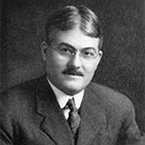
A pioneer in the field of surgery, George W. Crile grew up on a Chili, Ohio, farm and studied at Ohio institutions: Ohio Northern University (BA, 1884) and Wooster Medical College – now merged into Case Western Reserve University School of Medicine (MD, 1887). He furthered his studies in Vienna, London, and Paris. He served in the Medical Reserve Corps during the Spanish-American War, returning home to become professor of clinical medicine at Western Reserve University before going back to the military during World War I as a major in the Medical Officers’ Training Corps. He served with the British Expeditionary Forces in France and rose to the rank of colonel. Returning once more to Ohio, he was named chair of surgery at University Hospitals Case Medical Center in Cleveland, where in 1921, with Harvey Cushing, he co-founded the Cleveland Clinic.
Dr. Crile is recognized as the father of physiologic surgery and the first surgeon to have succeeded in direct blood transfusion. He performed and described the first successful radical neck dissection for head and neck cancers. He was instrumental in introducing the measurement of blood pressure during surgery, and he first used cocaine for regional anesthesia in the United States in an effort to ensure “shockless surgery,” for which he received a gold medal from the National Institute of Social Sciences. He also invented the Crile forceps and the pneumatic suit, the forerunner to the aviator’s antigravity suit.
Dr. Crile was a teacher, lecturer, and author, as well as a surgeon. In addition to his role in establishing the AACR, he was also a founder of the American College of Surgeons. He published more than 400 papers and 24 books, including A Mechanistic View of War and Peace in 1917, which is an unusually reflective short treatise on the nature and conduct of war from one who had been involved in two fierce conflicts. For his work in devising new treatments to prevent infection and surgical shock, he was awarded the Army Distinguished Service Medal in 1919.
Dr. Crile had passed the age of service when Hitler invaded Poland in 1937 and the world went back to war, but the United States honored him during World War II by naming a liberty ship SS George Crile. The lunar crater Crile is also named after him.